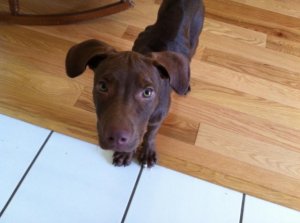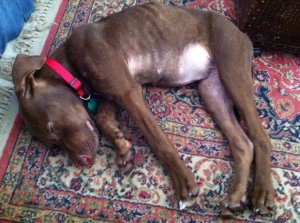Upgradable
Ideal_Rock
- Joined
- Aug 15, 2004
- Messages
- 5,537
We just adopted (from shelter) a five month old female rhodesian ridgeback puppy. She's learning commands well and is quite happy. But we're having some problems with housetraining. She was seriously underweight when we brought her home. She has been totally checked by the vet. Now we are on recommended food and her stool is better.
However, we're having problems with her soiling at one spot in the house, both poop and pee. We've used Nature's Miracle, but I don't think that is discouraging her from that spot.
I would love to hear any advice you have house training her. She's a darling thing, and this would make us all happier.
However, we're having problems with her soiling at one spot in the house, both poop and pee. We've used Nature's Miracle, but I don't think that is discouraging her from that spot.
I would love to hear any advice you have house training her. She's a darling thing, and this would make us all happier.










300x240.png)